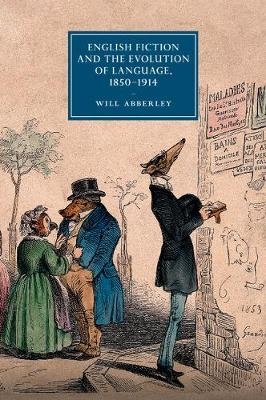
English Fiction and the Evolution of Language, 1850–1914
Seiten
2017
Cambridge University Press (Verlag)
978-1-107-49848-8 (ISBN)
Cambridge University Press (Verlag)
978-1-107-49848-8 (ISBN)
Will Abberley explores how Victorian fiction and science imagined the evolution of language, providing a new, historical angle on current debates about language evolution and the language of science. Abberley offers fresh perspectives on authors including Thomas Hardy and H. G. Wells, and genres including utopian, historical and science fiction.
Victorian science changed language from a tool into a natural phenomenon, evolving independently of its speakers. Will Abberley explores how science and fiction interacted in imagining different stories of language evolution. Popular narratives of language progress clashed with others of decay and degeneration. Furthermore, the blurring of language evolution with biological evolution encouraged Victorians to re-imagine language as a mixture of social convention and primordial instinct. Abberley argues that fiction by authors such as Charles Kingsley, Thomas Hardy and H. G. Wells not only reflected these intellectual currents, but also helped to shape them. Genres from utopia to historical romance supplied narrative models for generating thought experiments in the possible pasts and futures of language. Equally, fiction that explored the instinctive roots of language intervened in debates about language standardisation and scientific objectivity. These textual readings offer new perspectives on twenty-first-century discussions about language evolution and the language of science.
Victorian science changed language from a tool into a natural phenomenon, evolving independently of its speakers. Will Abberley explores how science and fiction interacted in imagining different stories of language evolution. Popular narratives of language progress clashed with others of decay and degeneration. Furthermore, the blurring of language evolution with biological evolution encouraged Victorians to re-imagine language as a mixture of social convention and primordial instinct. Abberley argues that fiction by authors such as Charles Kingsley, Thomas Hardy and H. G. Wells not only reflected these intellectual currents, but also helped to shape them. Genres from utopia to historical romance supplied narrative models for generating thought experiments in the possible pasts and futures of language. Equally, fiction that explored the instinctive roots of language intervened in debates about language standardisation and scientific objectivity. These textual readings offer new perspectives on twenty-first-century discussions about language evolution and the language of science.
Will Abberley is a research fellow for the Faculty of English Language and Literature, University of Oxford, exploring concepts of natural mimicry and deception in Victorian literature and the life sciences.
Introduction: language under a microscope; 1. The future of language in prophetic fiction; 2. Primitive language in imperial, prehistoric and scientific romances; 3. Organic orality and the historical romance; 4. Instinctive signs: nature and culture in dialogue; Conclusion: widening the lens; Bibliography.
| Erscheinungsdatum | 06.09.2017 |
|---|---|
| Reihe/Serie | Cambridge Studies in Nineteenth-Century Literature and Culture |
| Verlagsort | Cambridge |
| Sprache | englisch |
| Maße | 152 x 230 mm |
| Gewicht | 380 g |
| Themenwelt | Geisteswissenschaften ► Sprach- / Literaturwissenschaft ► Anglistik / Amerikanistik |
| Geisteswissenschaften ► Sprach- / Literaturwissenschaft ► Literaturgeschichte | |
| Geisteswissenschaften ► Sprach- / Literaturwissenschaft ► Literaturwissenschaft | |
| Naturwissenschaften ► Biologie ► Evolution | |
| ISBN-10 | 1-107-49848-1 / 1107498481 |
| ISBN-13 | 978-1-107-49848-8 / 9781107498488 |
| Zustand | Neuware |
| Haben Sie eine Frage zum Produkt? |
Mehr entdecken
aus dem Bereich
aus dem Bereich
Poetik eines sozialen Urteils
Buch | Hardcover (2023)
De Gruyter (Verlag)
CHF 83,90
Buch | Softcover (2024)
belleville (Verlag)
CHF 27,95


